The past remains integral to us all, individually and collectively. We must concede the ancients their place, but their place is not simply back there in a separate and foreign country; it is assimilated in ourselves, and resurrected into an ever-changing present. ~David Lowenthal
1547 – King Henry VIII died at the age of 55. At the time of his death, his waist measured 54 inches and he had to be moved about with the help of mechanical inventions.
1915 – An act of the U.S. Congress created the United States Coast Guard as a branch of the United States Armed Forces.
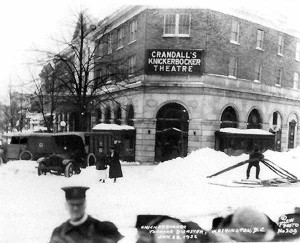
1922 – A blizzard dumped a measured 28 inches of snow at the main observing site in Washington, D.C. Railroad lines between Philadelphia and Washington were covered by at least 36 inches of snow, with drifts as high as 16 feet. Congress adjourned as a result of the storm, but the storm will always be remembered for the collapse of the Knickerbocker Theatre roof while a movie was playing.
The roof was flat, which allowed the snow which had recently fallen to remain on the roof. During the movie’s intermission – and in a storm like that, why was anyone at the movies? – the weight of the heavy, wet snow became too much for the roof to bear. The roof split down the middle, bringing down the balcony seating as well as a portion of the brick wall, killing 98 people and injuring another 133.
The disaster ranks as one of the worst in Washington, D.C. history. Congressman Andrew Jackson Barchfeld was among those killed in the theater. The theater’s architect, Reginald Wyckliffe Geare, and owner, Harry M. Crandall, later committed suicide.
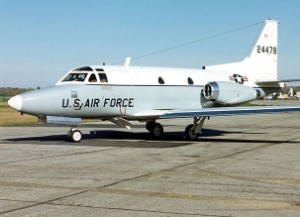
1964 – A USAF T-39 Sabreliner flying over West Germany on a training mission veered nearly 100 miles off course when the pilots became disoriented by a violent storm and crossed into East German airspace. The jet was shot down by a Soviet MiG-19 near Vogelsberg, killing all three aboard; Captain John F. Lorraine, 34, an instructor pilot; Lieut. Colonel Gerald K. Hannaford, 41; and Captain Donald G. Millard, 33.
The Soviet attack on the plane provoked angry protests from the Department of State and various congressional leaders, but the Soviets said they had every reason to believe that ”this was not an error or mistake. It was a clear intrusion.” Soviet officials also claimed that the plane was ordered to land but refused the instructions.
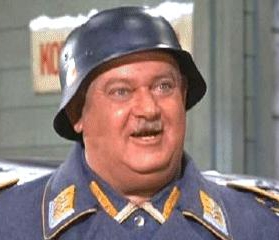
1973 – Actor John Banner (best known for his role as lovable Sergeant Schultz in the television comedy Hogan’s Heroes) died from an abdominal hemorrhage on his 63rd birthday.
Banner was born to Jewish parents in Vienna, Austria-Hungary. He briefly studied for a law degree at the University of Vienna, but decided instead to become an actor. In 1938, when he was performing with an acting troupe in Switzerland, Adolf Hitler annexed Austria to Nazi Germany. Banner escaped to the United States. He would later learn that his family members who had remained in Vienna all perished in Nazi concentration camps
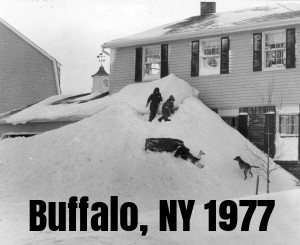
1977 – The Blizzard of 1977 started in Western N.Y. state, upstate New York and Southern Ontario and continued until February 1. Daily peak wind gusts ranged from 46 to 69 mph with snowfall as high as 100 inches. The high winds blew those already staggering amounts of snow into drifts of 30 to 40 feet. There were 23 total storm-related deaths in western New York, with 5 more in northern New York.
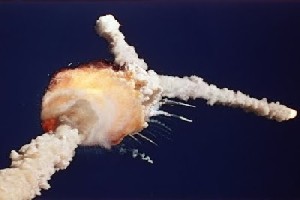
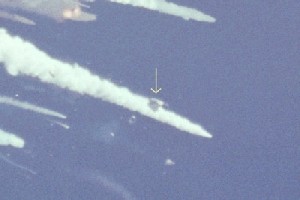
1986 – After a delay of five days because of weather problems and technical issue, the space shuttle Challenger lifted off from Cape Canaveral, Florida at 11:38 a.m. EST.
Seventy-three seconds later, hundreds on the ground stared in disbelief as the shuttle exploded in a forking plume of smoke and fire. Millions more watched the wrenching tragedy unfold on live television. There were no survivors.
On the night of the disaster, President Ronald Reagan had been scheduled to give his annual State of the Union address. He postponed the address for a week and instead spoke to the nation from the Oval Office of the White House.
He finished by quoting from the poem High Flight by John Gillespie Magee, Jr.: “We will never forget them, nor the last time we saw them, this morning, as they prepared for their journey and waved goodbye and ‘slipped the surly bonds of Earth’ to ‘touch the face of God.'”
On July 28, 1986, NASA’s Associate Administrator for Space Flight, former astronaut Richard H. Truly, released a report on the deaths of the crew (Francis R. Scobee, Commander, Michael J. Smith, Pilot, Ronald McNair, Mission Specialist, Ellison Onizuka, Mission Specialist, Judith Resnik, Mission Specialist, Christa McAuliffe, Payload Specialist, Gregory Jarvis, Payload Specialist).
“Our final conclusions are the cause of death of the Challenger astronauts cannot be positively determined; the forces to which the crew were exposed during Orbiter breakup were probably not sufficient to cause death or serious injury; and the crew possibly, but not certainly, lost consciousness in the seconds following Orbiter breakup due to in-flight loss of crew module pressure.”
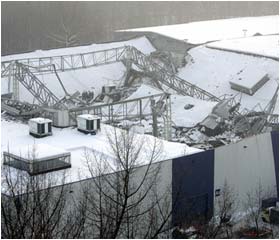
2006 – The roof of Katowice Trade Hall at the Katowice International Fair in Chorzów/Katowice, Poland, collapsed due to the weight of snow, killing 65 and injuring more than 170 others.
Compiled by Ray Lemire ©2016 RayLemire.com. All Rights Reserved.